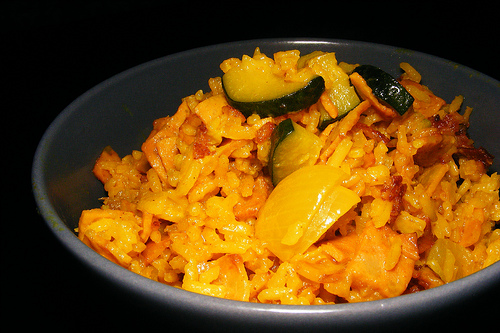By Nadine Moedt (Contributor) – Email
Print Edition: May 23, 2012
It has been long thought that the ingredients in curry have been a protective agent against many diseases. In 2007 Science News reported that researchers in the U.S. found that cucurmin, an anti-inflammatory compound, reduces the plaque-forming proteins that are responsible for Alzheimer’s disease. The spice, which has been used for centuries as part of traditional Indian Ayurvedic medicine, also raises HDL cholesterol (the good kind of cholesterol) and significantly lowers a person’s overall cholesterol levels.
In 2011, cucurmin, the main active ingredient of turmeric (itself one ingredient in curry powder) was reported to have positive effects on stroke and dementia patients. Researchers at Cedars-Sinai Medical Center in Los Angeles have begun human trials with cucurmin after promising results in experiments with rabbits. Dr Paul Lapchak, who led the study, reported that the cucurmin appeared to have an effect on “several critical mechanisms.” Lapchak stated that these mechanisms might help keep brain cells alive after a stroke. The spice works by encouraging new cell growth and preventing the deaths of cells following a stroke. Dr. Sharlin Ahmed, of The Stroke Foundation stated that this is “the first significant research of its kind.” Lab results from the tests run on rabbits also suggest that cucurmin might be effective even if administered up to three hours following a stroke.
In a recent article, BBC News reported evidence that cucurmin has the ability to kill bowel cancer tumors. Leicester University, a research university in England, is leading the investigation into the potential of curry as a cancer fighting substance. In the near future, cucurmin will be tested on cancer patients in tandem with chemotherapy drugs. In 2011, 22,000 people in Great Britain were diagnosed with bowel cancer. The death rate is approximately 50 per cent of those diagnosed.
Professor William Steward of Leicester University is heading the study. In an interview with the BBC, Steward explained that cucurmin’s potential to fight bowel cancer is related to the possibility that it increases “the sensitivity of cancer cells to chemotherapy,” reducing the level of chemotherapy doses needed and thus reducing the often devastating side effects that come with them. Steward stated that “once bowel cancer has spread, it is very difficult to treat, partly because the side effects of chemotherapy can limit how long patients can have treatment.” With the addition of cucurmin as part of the therapy, it becomes possible for the patient to undergo treatment longer than is normally the case; therefore, the potential for recovery is increased significantly. While the research is at an early stage, Steward is hopeful. Tests were run on animals, and those given cucurmin did “one hundred times better” under chemo than those without.
When the trial on humans begins, 40 patients will be given cucurmin pills for seven consecutive days before they start the standard chemotherapy treatment. The results of their enriched treatment will be compared to that of patients undergoing the standard chemotherapy treatment.
A representative from Cancer Research UK told the BBC that “by doing a clinical trial like this, we will find out more about the potential benefits of taking large amounts of cucurmin, as well as any possible side effects this could have for cancer patients.”
We can only hope that such a delicious ingredient will continue to surprise scientists with its positive health benefits. Now, who is up for a little curry for lunch?


